Trimetazidine
Uses
Trimetazidine is used to prevent angina (heart-related chest pain) and heart failure.
How it Works
How Trimetazidine Works Trimetazidine is an anti-anginal medication that reduces the oxygen requirement of the heart by shifting its metabolism from fats to glucose. As a result, the heart operates more efficiently.
Side Effects
Common side effects of Trimetazidine include dizziness, headache, nausea, weakness, itching, and dyspepsia.
Expert Advice
- Trimetazidine prevents new attacks of angina but does not relieve an acute attack.
- It does not affect heart rate or blood pressure at rest or during exercise.
- Trimetazidine improves HbA1c and blood sugar levels in patients with diabetes.
- Avoid driving or operating machinery if you experience dizziness after taking Trimetazidine.
Other Combinations
Metoprolol Succinate (Metoprolol Tartrate) + Trimetazidine
Related Medications
Trimetazidine 20mg

₹41.9

₹44
MRP ₹88
Trimetazidine 20mg

₹90

₹44
MRP ₹88
Trimetazidine 35mg

₹140

₹82
MRP ₹164
Trimetazidine 35mg

₹126

₹82
MRP ₹164
Trimetazidine 35mg

₹97

₹82
MRP ₹164
Trimetazidine 35mg

₹119

₹185.3
MRP ₹225.9
Trimetazidine 35mg

₹123

₹185.3
MRP ₹225.9
Trimetazidine 35mg

₹74.5

₹185.3
MRP ₹225.9
Trimetazidine 20mg

₹44
MRP ₹88
Trimetazidine 20mg

₹35.5

₹44
MRP ₹88
Trimetazidine 20mg

₹36

₹44
MRP ₹88
Trimetazidine 20mg

₹34.6

₹44
MRP ₹88
Trimetazidine 20mg

₹41.3

₹44
MRP ₹88
Trimetazidine 20mg

₹87.5

₹44
MRP ₹88
Trimetazidine 60mg
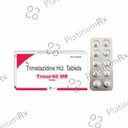
₹92
MRP ₹184
Trimetazidine 35mg

₹79

₹82
MRP ₹164
Trimetazidine 35mg

₹65

₹82
MRP ₹164
Trimetazidine 35mg

₹69.9

₹82
MRP ₹164
Trimetazidine 60mg

₹162.6

₹92
MRP ₹184
Trimetazidine 80mg

₹322.2

₹147.7
MRP ₹295.3
Trimetazidine 60mg
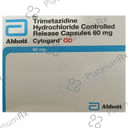
₹400.8
MRP ₹482.9
Trimetazidine 35mg
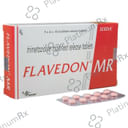
₹179.7

₹82
MRP ₹164
Trimetazidine 60mg
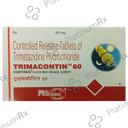
₹303.3

₹92
MRP ₹184
Trimetazidine 80mg
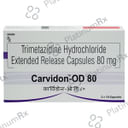
₹194

₹147.7
MRP ₹295.3
Trimetazidine 35mg

₹75

₹82
MRP ₹164
Flat ₹100 off on first app order | Use Code: APP100 |
Flat ₹100 off on first app order
USE CODE: APP100

Download Now